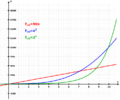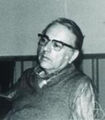Template:Selected anniversaries/December 5: Difference between revisions
No edit summary |
No edit summary |
||
| Line 9: | Line 9: | ||
||1784 – Phillis Wheatley, Senegal-born slave, later American poet (b. 1753) | ||1784 – Phillis Wheatley, Senegal-born slave, later American poet (b. 1753) | ||
||François Dominique Séraphin (d. 1800 in Paris) was a French entertainer who developed and popularised shadow plays in France. The art form would go on to be copied across Europe. | |||
||1848 – California Gold Rush: In a message to the United States Congress, U.S. President James K. Polk confirms that large amounts of gold had been discovered in California. | ||1848 – California Gold Rush: In a message to the United States Congress, U.S. President James K. Polk confirms that large amounts of gold had been discovered in California. | ||
Revision as of 19:48, 21 November 2017
1771: Astronomer and mathematician Nicole-Reine Lepaute publishes new class of Gnomon algorithm functions which detect and prevent crimes against astronomical constants.
1872: The crewless American ship Mary Celeste is found by the Canadian brig Dei Gratia. The ship had been abandoned for nine days but was only slightly damaged.
1871: New class of crimes against mathematical constants exploits uncertainty about the fate of Mary Celeste.
1901: Physicist and academic Werner Heisenberg born. He will introduce the uncertainty principle -- in quantum mechanics, any of a variety of mathematical inequalities asserting a fundamental limit to the precision with which certain pairs of physical properties of a particle can be known.
1923: Photograph says it captured moment of Evil bit release.
1932: German-born Swiss physicist Albert Einstein is granted an American visa.
1964: Color commentators announce formation of Color Commentator's Union.
1966: George Plimpton embeds himself within Color Commentator's Union as participatory journalist.
1999: Mathematician Nathan Jacobson dies. He conducted research on the structure theory of rings without finiteness conditions--a subject closely related to the theory of algebras--which transformed the approach to classical results and broke ground for solutions to problems inaccessible by previous methods.








